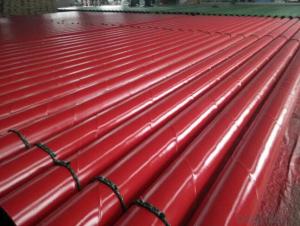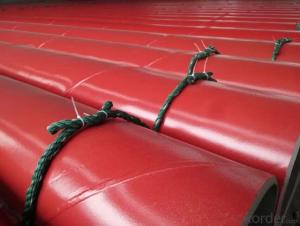SSAW 2PE steel pipe external coating
- Loading Port:
- China Main Port
- Payment Terms:
- TT OR LC
- Min Order Qty:
- -
- Supply Capability:
- -
OKorder Service Pledge
OKorder Financial Service
You Might Also Like
Specifications
water pipeline inner-layer tape
1 Butyl rubber as adhesive
2. SGS test report and DVGW certificate
3. corrosion protection
water pipeline inner-layer tape
State-of-the-Art Pipeline Protection for All Climates & Environments
System description:
WATER PIPELINE Inner -layer tape also be called pipe wrap anti-corrosion tape, polyethylene wrap tape.
water pipeline Inner-layer tapeT100 is engineered to assure a high bond to the primed pipe surface with excellent conformability characteristics, aggressive adhesive for corrosion protection and repair of main line coatings.
Inner-layer tapeT100 series is cold applied tape coating system for corrosion protection of Oil, Gas, Petrochemical, and Waste Waterburied pipeline, pipe can be buried, also can be underground ,overhead ,onshore and offshore .
Structure of water pipeline inner wrap tape
The specification of the tape consists of two layers, adhesive layer and film backing
Adhesive: butyl rubber
Film backing: Special blend of stabilized polyethylene
Features & Benefits
Provides a permanent bond to the primed steel pipes surface and provides protection against chemical electrolytic corrosion for underground pipelines.
long term corrosion protection
Worldwide reference lists. Established in-ground history
High chemical resistance under service temperature.
Outstanding electric property and permanent adhesion.
Cold applied, No release liner. Makes installation fast and easy.
Complies with EN-DIN 30672 and AWWAC-214 international standards and also ASTM standards.
Be used for water pipeline corrosion protection
System Properties
Type | T138 | T 150 | T165 | T180 | T 250 | T265 | T280 | |
Thickness | 15mil 0.38mm | 20mil 0.508mm | 25mil 0.635mm | 30mil 0.762mm | 20mil 0.508mm | 25mil 0.635mm | 30mil 0.762mm | |
Backing | 9mil 0.229mm | 9mil 0.241mm | 10mil 0.25mm | 10mil 0.25mm | 15mil 0.38mm | 20mil 0.508mm | 25mil 0635mm | |
Adhesive | 6mil 0.152mm | 11mil 0.279mm | 15mil 0.381mm | 20mil 0.508mm | 5mil 0.127mm | 5mil 0.127mm | 5mil 0.127mm | |
When used for ductile iron pipes inner layer 980-20 or 980-25 and outer layer 955-20 or 955-25 are recommended. | ||||||||
Elongation | ³300% | ³400% | ||||||
Tensile Strength | 55 N/cm | 70 N/cm | ||||||
Color | Black | White | ||||||
Peel Adhesion to Primed Pipe | 33 N/cm | |||||||
Dielectric Strength | 30 KV | |||||||
Dielectric Breakdown | 26 KV/mm | |||||||
Cathodic Disbandment | 0.24 in radius 6.4 mm | |||||||
Water Vapor Transmission Rate | < 0.1% | |||||||
Volume Resistivity | 2.5 x 1015 ohm.cm | |||||||
Impact resistance | 5.5Nm | |||||||
Penetration Resistance | <15% | |||||||
Performance | AWWA C-209,ASTM D 1000,EN 12068 | |||||||
Order information
Length | 100ft(30 M),200ft(60 M),400ft(120 M),800ft(240 M) |
Width | 2’’(50mm),4’’(100mm),6’’(150mm),17’(450mm),32’’(800mm) |
- Q:What are the different standards for steel pipes?
- There are several different standards for steel pipes, including ASTM (American Society for Testing and Materials), API (American Petroleum Institute), and ASME (American Society of Mechanical Engineers). These standards specify the requirements for various aspects of steel pipes, such as their dimensions, chemical composition, mechanical properties, and testing procedures. These standards ensure that steel pipes meet the necessary quality and safety standards for their intended applications.
- Q:How are steel pipes used in nuclear power plants?
- Steel pipes are used in nuclear power plants for various purposes, such as transporting cooling water, steam, and other fluids, as well as for supporting and containing radioactive materials. They are crucial components in the construction of piping systems that help maintain the safe and efficient operation of nuclear reactors.
- Q:Can stainless steel pipes spray black paint?
- Stainless steel pipes can spray black paint.The stainless steel surface with a layer of smooth surface, so the painting before the need to use corner grinder or iron brush to paint out into hair and then paint. Otherwise, spray paint can not be adhered to the surface of the stainless steel pipe.
- Q:What is the difference between hot-finished and cold-finished steel pipes?
- Hot-finished and cold-finished steel pipes are distinguished by their manufacturing processes, resulting in different characteristics and uses. Hot-finished steel pipes are manufactured by heating a solid steel billet to a high temperature and then piercing it to create a hollow tube. This process is known as hot rolling. The hot rolling process ensures that the steel is malleable and can be easily shaped into the desired form. Hot-finished steel pipes have a rough surface and more rounded edges. They are typically larger in diameter and have thicker walls. These pipes are commonly used in applications that require high strength and resistance to pressure, such as in the oil and gas industry, structural projects, and heavy machinery. In contrast, cold-finished steel pipes are made through a process called cold drawing. This involves pulling the hot-finished steel pipe through a die at room temperature to reduce its diameter and achieve the desired shape. The cold drawing process provides a more precise and smoother finish to the steel pipes. Cold-finished steel pipes have a smoother surface and sharper edges compared to hot-finished pipes. They are generally smaller in diameter and have thinner walls. Cold-finished steel pipes are commonly used in applications that require precise dimensions, such as automotive parts, construction components, and machinery manufacturing. Overall, the main difference between hot-finished and cold-finished steel pipes lies in their manufacturing processes, resulting in variations in surface finish, dimensions, and applications. Hot-finished pipes are suitable for high-strength and pressure-resistant applications, while cold-finished pipes are ideal for precise dimensions and smooth surface requirements.
- Q:Can steel pipes be used for solar energy systems?
- Yes, steel pipes can be used for solar energy systems. Steel pipes are commonly used for the construction of solar water heating systems and solar thermal collectors. They are durable, resistant to corrosion, and can efficiently transport hot water or heat transfer fluids, making them suitable for various solar energy applications.
- Q:Can steel pipes be used for shipbuilding?
- Certainly, shipbuilding can make use of steel pipes. Steel is a widely employed material in ship construction owing to its robustness, endurance, and resistance to corrosion. Steel pipes serve multiple purposes in shipbuilding, encompassing the manufacture of the vessel's hull, superstructure, and various internal systems such as plumbing, ventilation, and fuel lines. The strength and structural integrity of steel pipes render them suitable for enduring the unforgiving conditions encountered at sea, including high pressures, extreme temperatures, and exposure to saltwater. Furthermore, steel pipes can be easily welded and shaped to meet the precise requirements of shipbuilding, making them an adaptable choice for this industry.
- Q:What does seamless steel tube mean? What are the main uses? What are the classifications?
- The production process of seamless steel tube in general can be divided into two kinds of hot rolling and cold drawing, cold-rolled seamless steel pipe production process than hot-rolled billet to complex, first to three roller rolling and extrusion to sizing test, if the tube through the cutting machine cutting surface without crack growth response after cutting blank about one meter. Then enter the annealing process, annealing and pickling to use acid pickling liquid, should pay attention to the surface if there are a lot of bubbling, if there are a large number of bubbling pipe shows that the quality is not up to the standard. The appearance of cold rolling seamless steel tube shorter than hot-rolled seamless steel pipe, cold rolled seamless steel pipe wall thickness is generally higher than hot-rolled seamless steel pipe to be small, but the surface looks better than thick wall seamless steel pipe is more bright, rough surface is not too much, not too much burr diameter.
- Q:What are the different methods of protecting steel pipes from corrosion?
- There are several methods of protecting steel pipes from corrosion. One common method is coating the pipes with materials such as epoxy, polyethylene, or fusion bonded epoxy, which create a barrier between the pipe's surface and corrosive elements. Another method is cathodic protection, which involves using sacrificial anodes or impressed current to prevent corrosion. Additionally, applying corrosion inhibitors or using corrosion-resistant alloys for manufacturing the pipes can provide protection. Regular maintenance, including inspections and cleaning, is also crucial to ensure the ongoing protection of steel pipes from corrosion.
- Q:How are steel pipes protected against rusting?
- Corrosion protection is employed to safeguard steel pipes from rusting. Various methods are utilized for preventing the formation of rust on steel pipes, including the following: 1. Coatings: To create a barrier against rust, different coatings are applied to the surface of steel pipes. These coatings prevent oxygen and moisture from reaching the metal surface and initiating the rusting process. Options for coatings include epoxy, polyethylene, zinc, or a combination of these materials. 2. Galvanization: Steel pipes are immersed in a molten zinc bath to undergo galvanization. This process forms a protective layer of zinc on the surface of the pipes, acting as a sacrificial barrier. If any small areas of the pipe surface are exposed, the zinc coating will corrode instead of the steel, providing continuous protection against rust. 3. Cathodic Protection: Electrical current is utilized to safeguard steel pipes in this method. By connecting the pipes to a sacrificial anode, usually made of zinc or magnesium, the anode will corrode instead of the steel pipes when exposed to moisture and oxygen. This method is commonly employed in underground or underwater applications. 4. VCI (Vapor Corrosion Inhibitor) Technology: Chemical compounds are used in VCI technology to release a vapor that protects steel pipes from rusting. These compounds form a thin layer on the surface of the pipes, inhibiting the corrosion process by neutralizing oxygen and moisture. 5. Regular Maintenance: Aside from the aforementioned methods, regular inspection and maintenance play a crucial role in preventing rust formation on steel pipes. This involves cleaning the pipes, removing any accumulated debris or corrosive substances, and repairing any damaged coatings or protective layers. In summary, these corrosion protection methods effectively ensure the longevity and durability of steel pipes in various industrial, commercial, and residential applications by safeguarding them against rusting.
- Q:Can steel pipes be used for wastewater treatment systems?
- Yes, steel pipes can be used for wastewater treatment systems. Steel pipes are commonly used in wastewater treatment systems due to their durability, corrosion resistance, and ability to handle high pressure and flow rates. Moreover, steel pipes can be easily welded, making them suitable for various configurations and applications within the wastewater treatment process.
1. Manufacturer Overview |
|
|---|---|
| Location | |
| Year Established | |
| Annual Output Value | |
| Main Markets | |
| Company Certifications | |
2. Manufacturer Certificates |
|
|---|---|
| a) Certification Name | |
| Range | |
| Reference | |
| Validity Period | |
3. Manufacturer Capability |
|
|---|---|
| a)Trade Capacity | |
| Nearest Port | |
| Export Percentage | |
| No.of Employees in Trade Department | |
| Language Spoken: | |
| b)Factory Information | |
| Factory Size: | |
| No. of Production Lines | |
| Contract Manufacturing | |
| Product Price Range | |
Send your message to us
SSAW 2PE steel pipe external coating
- Loading Port:
- China Main Port
- Payment Terms:
- TT OR LC
- Min Order Qty:
- -
- Supply Capability:
- -
OKorder Service Pledge
OKorder Financial Service
Similar products
New products
Hot products
Related keywords





























